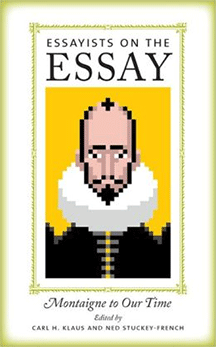By Sean Ross Meehan
In an essay on “Emerson and the Essay,” the essayist William Gass elegantly defined the genre at hand as “born of books.” With an ear toward Emerson, one could characterize the essay as the record of a writer’s creative reading. This new anthology that includes extended excerpts from Gass and forty-nine other essayists, ranging from Montaigne’s “Of Repentance” to Ander Monson’s digitally inspired “The Essay as Hack,” demonstrates that this reflexivity of the genre (essays about essayists and their essays) is fundamental and longstanding. Thus Cynthia Ozick describes in her essay on the essay “the movement of a free mind at play,” echoing back, like so many of these essayists, to Montaigne’s invention of the name and form of this literary experiment: “If my mind could gain a firm footing, I would not make essays, I would make decisions; but it is always in apprenticeship and on trial.” Every essay begins or ends as an ars poetica.
This collection reveals the delight that writers since Montaigne have taken in pursuing that apprenticeship toward the mind’s firmer footing, even to the point of questioning whether the essay can be defined as such—and in an essay no less. The genre, Adorno asserts, is “antigenre,” proceeding “methodically unmethodically.” That is likely not the essay you learned to write in school. The editors of this lively and unique selection of essayists, both teachers and critics of the genre with roots in Iowa’s Nonfiction Writing Program, know that and offer this anthology as a corrective to the critical neglect of the essay, despite its popularity as a literary form. The bibliographic approach in this collection is perhaps most useful for those who would teach the essay, allowing student writers to listen in on a rich tradition of essay writing toward a more poetic and vigorous conception of the genre that we, for good reason, continue to use in schools for educational apprenticeship. And yet, though I had one eye toward an upcoming course on the essay while reading through these selections, I confess to finding a less-utilitarian pleasure in the ways these essayists, our essayists, meditate, reflexively and insightfully, upon the purpose of their writing. In places, I wanted to read the full essay (only a few are provided) and to witness the range of the mind at play rather than its excerpt. However, the experience sent me from my reading in search of the full text and the further conversation with the essayist at work.
Sean Ross Meehan (ΦBK, Princeton University, 1991) is Associate Professor of English and Director of Writing at Washington College. He is a resident member of the Theta of Maryland chapter of Phi Beta Kappa.




